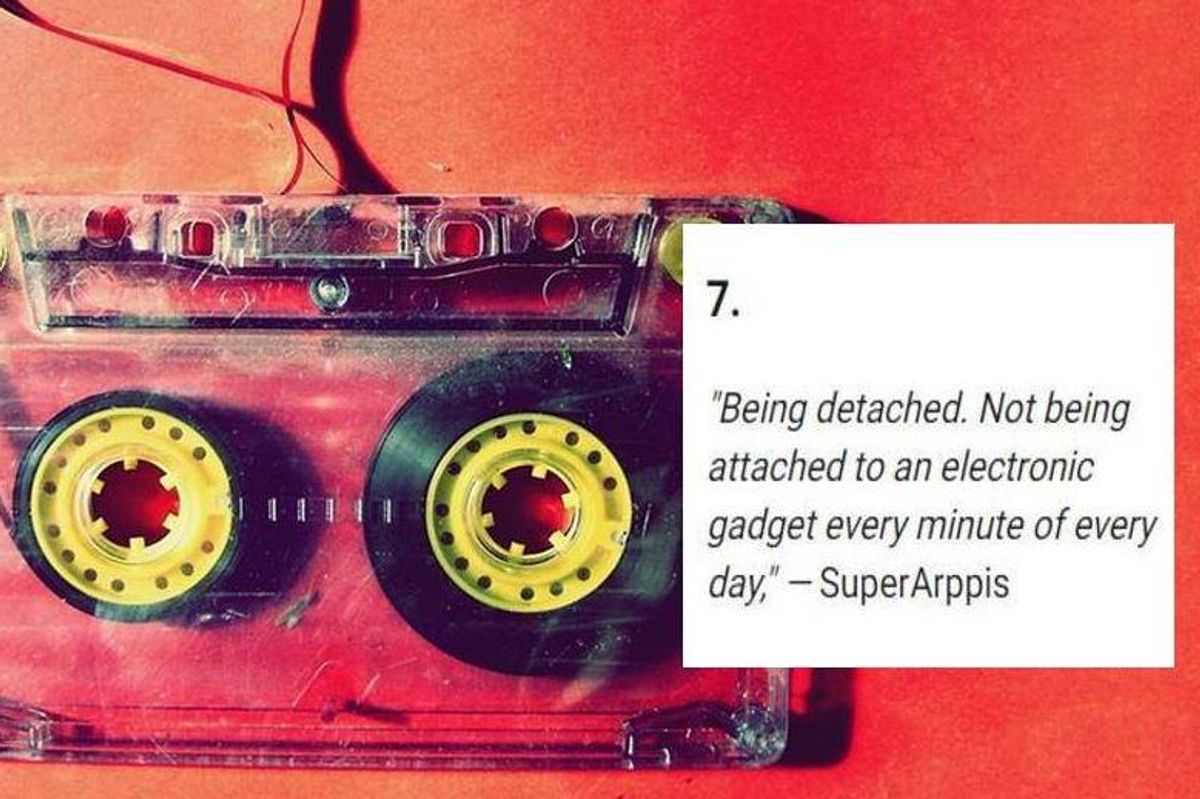People are sharing the ’90s trends they totally want back and it’s an oasis of nostalgia
What trends would you bring back? Cheap gas? Hypercolor shirts?

If you know how to fix this tape, you grew up in the 1990s.
There are a lot of reasons to feel a twinge of nostalgia for the final days of the 20th century. Rampant inflation, the aftermath of a global pandemic and continued political unrest have created a sense of uneasiness about the future that has everyone feeling a bit down.
There’s also a feeling that the current state of pop culture is lacking as well. Nobody listens to new music anymore and unless you’re into superheroes, it seems like creativity is seriously missing from the silver screen.
But, you gotta admit, that TV is still pretty damn good.
A lot of folks feel Americans have become a lot harsher to one another due to political divides, which seem to be widening by the day due to the power of the internet and partisan media.
Given today's feeling of malaise, there are a lot of people who miss the 1990s or, as some call it, “the best decade ever.” Why? The 1990s was economically prosperous, crime was on its way down after the violent ’70s and ’80s, and pop culture was soaring with indie films, grunge rock and hip-hop all in their golden eras.
The rest of the world was feeling hopeful as globalization brought prosperity and Communism fell in Europe and Asia.
The mood in America would swiftly change at the turn of the century when the dot-com bubble burst in 2000 and the 2001 9/11 attacks would lead to the never-ending "war on terror."
A Reddit user by the name purplekat20 was clearly feeling some ’90s nostalgia on May 16 when they asked the online forum to share “What ’90s trend would you bring back?” A lot of people noted that it was a lot cheaper to get by in the ’90s, especially considering gas and rent prices. Others missed living in the real world instead of having one foot in reality and the other online.
Here are 17 things people would love to bring back from the 1990s.
1.
"Inflatable furniture and transparent electronics." — Dabbles-In-Irony
2.
"Hope." — DeadOnBalllsaccurate
To which HowardMoo responded: "I hate this despair thing that's all the rage these days. I miss optimism."
3.
"The '90s web was the best web. People actually made their own home pages. Now it's all social media." — IBeTrippin
4.
"Affordable housing." — Amiramaha
5.
"Ninety nine cent per gallon gas." — Maxwyfe
6.
"The 'mean people suck' statement everywhere. People seemed generally a lot happier and kinder back then. It was a nice reminder to be kind." — simplyintentional

via Reddit
7.
"Being detached. Not being attached to an electronic gadget every minute of every day." — SuperArppis
8.
"Calling fake-ass people 'poser.' The state of social media and 'reality' tv demands that this word be taken out of retirement." — rumpusbutnotwild
9.
"Grunge music." — ofsquire
10.
"I want movies to be the same caliber as '90s." — waqasnaseem07
Cremmitquada nailed it on the head with their response, "Everything has been redone. It's all recycled ideas now."
11.
"Pants that didn't have to be super-tight to be in style." — chad-beer-316
12.
"People really expressing themselves. Very few people take any risks with style anymore, or they do something 'different' that's just enough to still conform. In the '80s and '90s there were people doing crazy things with hair and piercing and just didn't give a fuck. I don't think I'll ever see that come back." — FewWill
13.
"Great animated TV. Spongebob started in the 90s (99 but it counts), Hey Arnold, X-Men, Batman, Justice League, Dexter's Lab, Powerpuff Girls, Boomerang cartoons... the list goes on." — Phreedom Phighter
14.
"Fast food restaurant interiors." — Glum-Leg-1886
Another fantastic photo of Taco Bell in the 1990s, before the disease of modernismpic.twitter.com/GIiAyNWxiu— Jules (@Jules) 1590273071
15.
"Hypercolor shirts and neon puff paint designs on t-shirts. But here in a few months, that'll be changed to abortion and voting rights, probably." — TheDoctorisen
16.
"News that was news instead of rage bait." — nmj95123
17.
"We had a stable country with a vigorous economy. In fact, we drew a budget surplus some of those years." — jeremyxt
- People share what they loved about the '90s - Upworthy ›
- Man gives epic recaps of 90s movies and TV shows - Upworthy ›
- Normal things from the 90s and 00s that are now a luxury - Upworthy ›
- People born before 1990 share their outdated skills - Upworthy ›
- Comedian's song about life in the 90s is total nostalgia - Upworthy ›
- The sound of the late '90s - Upworthy ›
- Lamb Chop and Mallory Lewis are creating millennial nostalgia - Upworthy ›
- 10 lies '90s parents told their kids - Upworthy ›
- 6 nostalgic products people are demanding make a come back - Upworthy ›
- Odd 'Cookie' Beanie Baby sells out after going viral - Upworthy ›
- People born before 1990 are sharing their now-useless (but 100% nostalgic) skills - Upworthy ›
- Students help 80-year-old janitor retire - Upworthy ›
- Backstreet Boys bring their kids onstage to sing - Upworthy ›
- Relive your '80s nostalgia with this vintage ABC promo video - Upworthy ›
- Watch this hilarious '90s video for a headset - Upworthy ›
- Oasis reunion tour brings back the bucket hat. For many millennials, it's a sign of hope. - Upworthy ›



 Teens hanging out in a living room.via
Teens hanging out in a living room.via  Teenagers eating pizza.via
Teenagers eating pizza.via  Teenagers eating pizza.via
Teenagers eating pizza.via 
 Older people can become frustrated over seemingly small things.
Older people can become frustrated over seemingly small things. Having compassion for older generations can go a long way.
Having compassion for older generations can go a long way. 

 One Redditor saved big by switching from paper towels to cloths. Photo by
One Redditor saved big by switching from paper towels to cloths. Photo by  Candles smell great, but are a totally unnecessary purchase for most people. Photo by
Candles smell great, but are a totally unnecessary purchase for most people. Photo by  A bidet toilet seat might be an investment, but it'll save you tons on toilet paper. Photo by
A bidet toilet seat might be an investment, but it'll save you tons on toilet paper. Photo by 
 Buy dozens of pairs of the same socks. Photo by
Buy dozens of pairs of the same socks. Photo by  The most stable, reliable investment you could make. Photo by
The most stable, reliable investment you could make. Photo by
Mom is totally humiliated after her kindergartner tells the teacher what she does for work